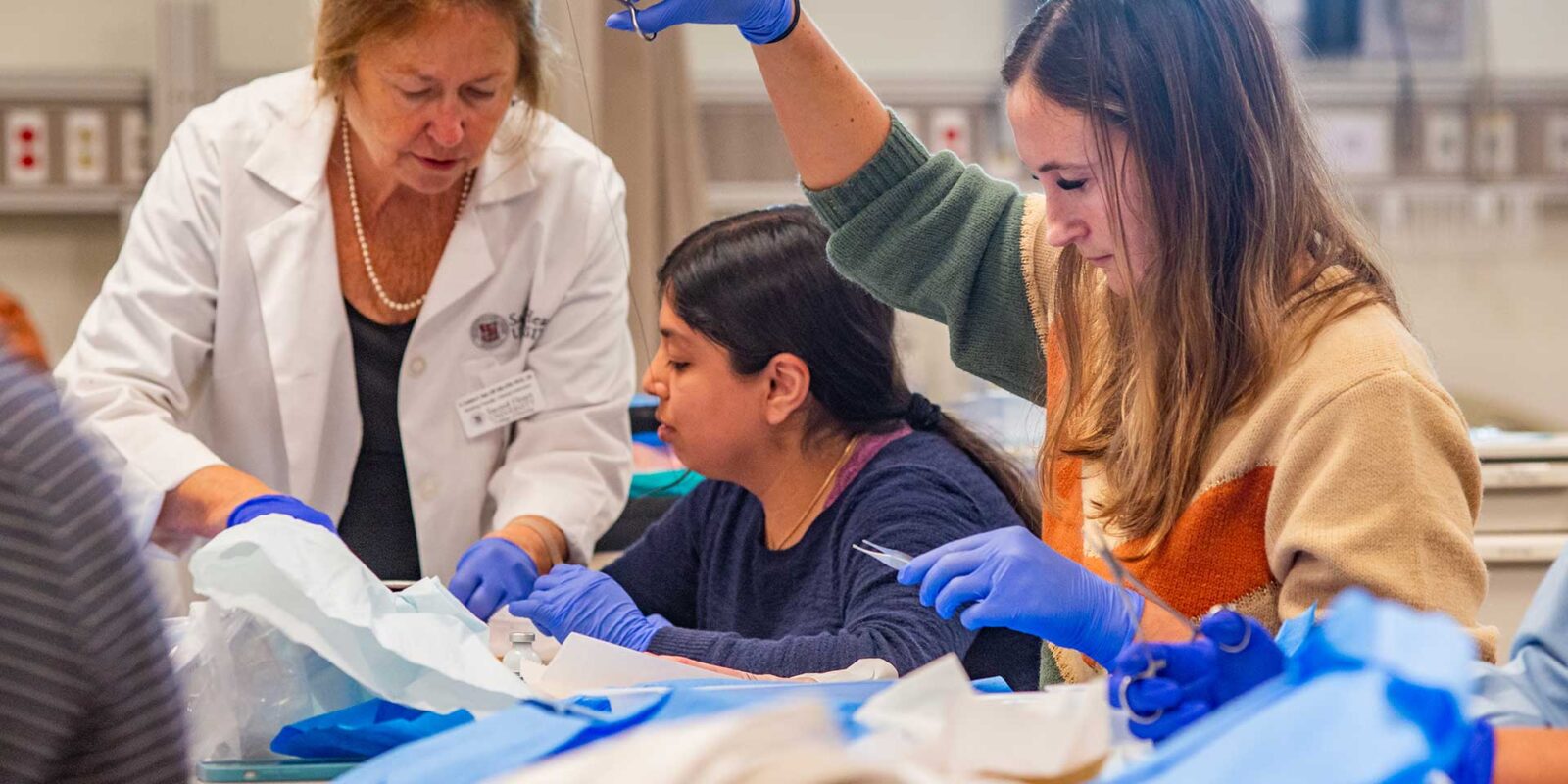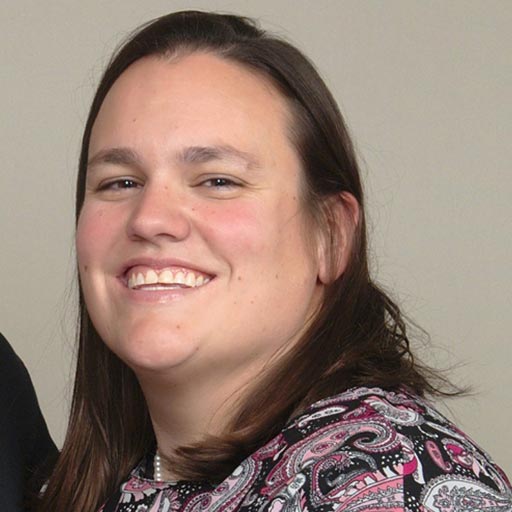Online MSN: FNP Program

Focus on Primary Patient Care with Our Online FNP Program
Online with Residencies
2.5-Year Duration
42 Credit Hours
$955 per Credit
Learn More Today
Complete the form to learn more about this program.
Acquire Your MSN: FNP Degree Without Pausing Your Career
- One start date per year
- No GRE/GMAT requirements
Nurse practitioners are in high demand, with 40% job growth projected from 2024 to 2034.1 They also provide a wider scope of patient care than registered nurses, making this role essential to solving advanced health care challenges.
With Sacred Heart University’s MSN: Family Nurse Practitioner program, you can engage in a rewarding education that puts you on track for an FNP career. The online courses and clinical experiences deliver skills and qualifications for conducting physical exams, diagnosing diseases and treating common illnesses and injuries. Plus, prepare to offer health care guidance within diverse family systems and empower patients to make lifestyle choices that benefit their long-term health.
Sacred Heart’s online MSN: FNP program offers a high-quality learning experience, with accreditation from the Commission on Collegiate Nursing Education (CCNE). Request information to learn more.
MSN: FNP Online Program Details
- Accredited by the Commission on Collegiate Nursing Education (CCNE)
- Experience flexible online courses that allow you to study when it’s convenient
- Prepare to sit for FNP certification exams offered by the American Nurses Credentialing Center (ANCC) or the American Academy of Nurse Practitioners Certification Board (AANPCB)
Preview the Curriculum for the Online FNP Program
You’ll accrue 42 credit hours to complete our MSN: FNP program online. While learning from committed faculty members, you’ll develop skills for leveraging health assessments, statistical data and diagnostic reasoning processes to provide compassionate care across the lifespan. The courses also enable you to communicate health plans to diverse patients while imparting knowledge of the various drug groups, helping you manage drug therapies and mitigate adverse reactions.
In addition to the online courses, you’ll build hands-on experience by completing clinical requirements. For this aspect of the program, you’ll secure a clinical placement and may need to travel significant distances to access sites that provide the necessary clinical hours.
After completing Sacred Heart’s FNP program, you’ll be ready to sit for national certification exams available through ANCC or AANPCB. We also offer a Post-MSN Family Nurse Practitioner Certificate to RNs interested in advancing into family nurse practitioner roles.
MSN: FNP Required Courses
This course, the first within the Family, Primary Care, and Community sequence, addresses selected family, primary care, and community theories within the context of advanced practice nursing and clinical leadership roles. The family system is viewed as both unique and dynamic, existing interdependently with the community and the environment and requiring advanced nursing expertise and caring at various times across the life cycle. Particular emphasis is placed on family and community assessment strategies, the impact of culture upon the family and community systems, and the impact of various primary care-oriented health problems on family roles and functions. In addition, relevant concepts and principles of epidemiology are applied to the current and emerging health status of families and communities. Faculty collaborate with students as they apply advanced clinical knowledge to the family system in a community setting. Students function interdependently with other health team members in the care of families and evaluate a plan of care using standards for advanced clinical practice.
This class focuses on the pharmacotherapeutic principles of drugs most commonly used in the primary care setting. Topics include the pharmacologic effects and clinical uses of various drug groups and classifications. Emphasis is placed on rational drug therapy for agent selection, monitoring drug therapies, identification and avoidance of adverse drug reactions and interactions, and extensive patient education and counseling.
Students learn to assess in the biopsychosocial health status of clients across the life span in depth by obtaining a complete and accurate health history and by performing a thorough physical examination, then using the acquired data to formulate a working medical diagnosis. Content is designed to provide correlation of assessment strategies with an understanding of the mechanisms of illness and health problems of the main body systems, as well as to address the integration of common medical testing. Students explore role of the advanced practice nurse in the current health care delivery system. The laboratory component enables students to develop advanced assessment skills.
This is the first of four clinical courses in this online nurse practitioner program designed to enable students to learn problem-solving skills and clinical strategies necessary to socialize into the role of the Family Nurse Practitioner. Coursework introduces students to a systematic approach to understanding the delivery of primary health care to the well adult. Various principles of illness prevention and health maintenance are introduced, as well as methodologies used to diagnose and treat common primary care problems. Emphasis is on the consultation role component of the nurse practitioner as well as on the direct provision of primary care and health promotion.
This course provides FNP students with a comprehensive understanding of the pathophysiology of disease processes most commonly seen afflicting patients across the lifespan. Clinical pathology content addresses alterations in major body systems that are commonly found in primary care settings, as well as common testing used in the diagnostic process.
Primary Care of Children applies knowledge of wellness and prevention to children, focusing on birth through adolescence. Topics include health promotion/maintenance, growth and development, disease prevention, diagnosis and treatment of common acute and chronic illnesses in diverse infant, child, and adolescent populations. Emphasis is placed on a primary, collaborative, community approach with interprofessional teams as a foundation for clinical practice. In addition to didactic, students participate in clinical experiences.
Primary Women’s Healthcare introduces the Family Nurse Practitioner student to well woman care and care of the antepartum woman. The course will enable students to participate in clinical decision making in the primary care of women, from adolescents through the menopause transition. Gynecologic and antepartum management including cervical and breast cancer screenings, contraceptive care, acute and chronic gynecologic pathologies, and healthy prenatal examinations will be covered. In addition to didactic, students participate in clinical experiences.
Primary Care II: Advanced Primary Care of Families in Complex Systems
The fourth of four clinical courses designed to enable graduate FNP students to learn problem-solving skills and clinical strategies necessary to diagnose and treat common and complex primary care problems found in complex adult families and their members. Emphasis is on the leadership role component of the nurse practitioner as well as on the direct provision of primary care. In addition to classes, students participate in clinical experiences.
Prerequisites: NU 566, NU 551, NU 552, NU 561, NU 606, and NU 607
In addition to the specialization requirements, you’ll take core courses to acquire foundational knowledge for advanced nursing roles. Taught by our experienced faculty, these courses explore health care policy, the principles of health care research, evidence-based practice and beyond.
View Program CurriculumCareer Outlook: Rapid Employment Growth
Demand is high for nurse practitioners, as employment is expected to grow much faster than other occupations over the next 10 years.1 In addition to working in specialty hospital settings, nurse practitioners provide primary care services for doctor’s offices, businesses and a variety of professional organizations. Because this program prepares you to attain FNP certification through ANCC or AANP, you’ll be ready to pursue in-demand roles with impressive salaries.
Nurse Practitioner Median Salary $129,210 Per Year in May 20241
Nurse Practitioner Job Growth 40% 2024 to 20341
Faculty: Accomplished and Accessible
In your MSN online program, you will work directly with doctorally prepared faculty members with years of experience in their nursing specialties, extensive scholarly credentials and cutting-edge knowledge from the field. In addition to being well-versed in online teaching, our award-winning professors are available to answer your questions and offer support as you take the next step in your nursing journey.

Program Director – Online Graduate Nursing Programs & Associate Clinical Professor
Faculty Spotlight: Mary B Kaylor, Ph.D., RN
Dr. Mary Beth Kaylor received her Bachelor of Science in Nursing at Wright State University and began working in the Emergency Department at Children’s Medical Center in Dayton, Ohio while attending. She completed a Masters in Nursing and Health Systems Administration and PhD in Nursing with a cognate focus in health policy from the Ohio State University. After graduation she began teaching nursing at Wright State University. While there she completed a Masters in Public Health and a Certificate in Nursing Education. She also completed the Center for Transdisciplinary Evidence-based Practice Immersion program at the Ohio State University and the Intermediate Improvement Science Series program at Cincinnati Children’s Hospital.
Mary Beth also served as a nursing research consultant for the Kettering Health Network and worked for the Ohio Department of Medicaid. She has been the PI for many research projects including an AHRQ funded study on telemedicine, bed bugs prevalence, caring in hospital based nurses, and faculty/nursing beliefs about evidence based practice to name a few. She currently serves on the State of Ohio Department of Health Institutional Review Board.
Degrees & Certifications
- PhD, The Ohio State University
- MPH, Wright State University
- MS of Nursing, The Ohio State University
- BSN, Wright State University
- Certified Nurse Educator
- Advanced Public Health Nurse – Board Certified
Teaching Responsibilities
- Nursing Role Development
- Executive Nursing Leadership Practicum
- Research
Awards & Fellowships
- Nominated 2018 Excellence in Educational Research Award
- Sigma Theta Tau

Associate Professor & Assistant Program Director
Faculty Spotlight: Marguerite Lawrence, DNP, FNP-BC, PHCNS-BC, MA
Marguerite Lawrence is an Associate Professor of Nursing at Sacred Heart University and is the Assistant Program Director for the Family Nurse Program. Originally from Brooklyn, NY, Marguerite served over 20 years of active-duty military service as a family nurse practitioner. Marguerite has taught in the asynchronous graduate level since 2018 and was awarded the online teacher of the year award. Marguerite’s focus of teaching is on enhancing online learning. Marguerite currently lives in Brussels, Belgium supporting her active-duty husband, who is assigned to NATO.
What You’ll Learn
Sacred Heart’s MSN program delivers competencies that you’ll need to excel in today’s diverse health care community. Through the core and specialization courses, you can prepare to improve patient outcomes, pursue nurse practitioner positions, lead nursing teams and teach in clinical settings.
Program Learning Outcomes
- Translate into action the knowledge from philosophical and theoretical traditions of nursing science and other disciplinary perspectives to facilitate the ethical integration of evidence-based practice to advance nursing scholarship.
- Lead collaboratively within the interprofessional team to develop and evaluate plans of care with evidence-based, person-centered care principles promoting quality and safety outcomes.
- Collaborate with strategic partners to implement health policy while advocating for equitable and sustainable population health care.
- Integrate complex systems-based practice to develop innovative and evidence-supported equitable solutions to improve health outcomes across the lifespan of diverse populations.
- Apply best practices of informatics and communication technologies in diverse care settings to collect, analyze and synthesize data to promote quality and safe health care outcomes.
- Demonstrate professional behaviors reflecting current regulations, policies and practice integrating professional concepts, including ethics, compassion, diversity, equity and inclusion.
- Model leadership within the nursing profession that embraces self-care, a spirit of inquiry, advocacy, change, mentorship and service to others.
Explore More MSN Specializations
We offer additional MSN specializations to deliver the specific nursing expertise your goals demand. Explore these options to embark on your journey to becoming a nurse practitioner, educator or leader.
Frequently Asked Questions
If you have a question we don’t cover here, request more information or call 877-791-7181.
Yes. The baccalaureate degree program in nursing, the master’s degree program in nursing, and the Doctor of Nursing Practice program at Sacred Heart University are accredited by the Commission on Collegiate Nursing Education, 655 K Street, NW, Suite 750, Washington, DC 20001, 202-887-6791.
For nurses who are evaluating prospective programs, the accredited status tells them that the education they receive will provide them with the knowledge to practice at the next level in their nursing career. It’s also significant for students who may want to continue to further education, as most master’s degree programs will not accept candidates whose BSN has not been conferred from an accredited university or program.
The deadline is four weeks prior to the start date unless the program has reached capacity. We encourage you to apply early and secure your spot in the program if you’re considering the upcoming term.
There is no licensure for this program. The online MSN in Clinical Nurse Education will make you eligible to sit for the Nurse Educator Certification from the National League for Nursing.
You’ll complete 36–39 credits to earn your MSN, depending on the specialization you select.
We like to keep our class sizes small. Sacred Heart’s nursing programs typically have 15-28 students per online course.
You can earn a Master of Science in Nursing with Sacred Heart University within two years.
Source
- Bureau of Labor Statistics, U.S. Department of Labor. Occupational Outlook Handbook. “Nurse Anesthetists, Nurse Midwives, and Nurse Practitioners.” Retrieved Sept. 23, 2025, from https://www.bls.gov/ooh/healthcare/nurse-anesthetists-nurse-midwives-and-nurse-practitioners.htm.
